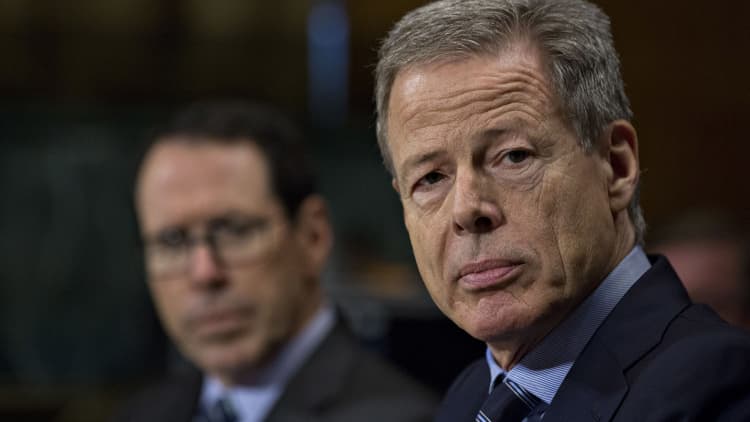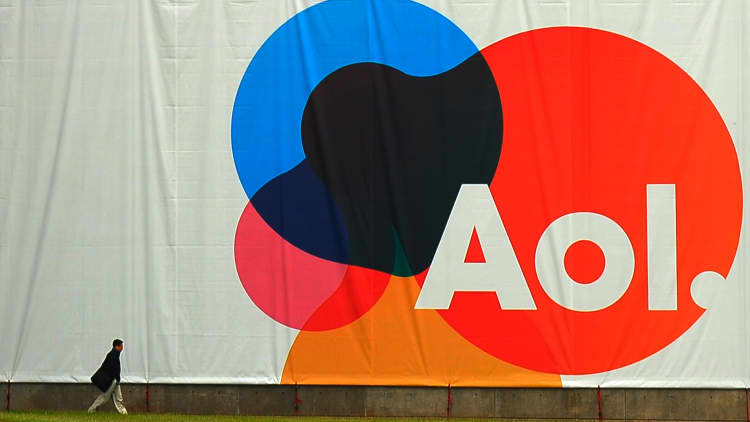
When AT&T acquired Time Warner last year for $104 billion, the strategic rationale behind the deal was "vertical integration" — combining content and distribution within one company.
As it turns out, the man who sold Time Warner to AT&T doesn't think that's sound strategy.
In an exclusive interview with CNBC, ex-Time Warner Chief Executive Officer Jeff Bewkes said he doesn't think vertical integration is necessary for either a content or a distribution company. While he didn't speak to the AT&T-Time Warner deal specifically, Bewkes said limiting the number of people who can watch specific content by offering it only to those who sign up for a specific service is not optimal. Bewkes spoke about vertical integration in a CNBC interview about the rise and fall of AOL. He noted the same flawed ideas helped doom the AOL-Time Warner merger in the early 2000s.
"It's not so much a question of whether a piece of content or content provider owns a distribution entity, because frankly there will always be multiple competing content developers and competing distribution outlets," said Bewkes. "That means by definition that narrowing either the distribution for your content or narrowing the source of content for your distribution platform is a fairly suspect premise."
Bewkes left Time Warner last year, days after AT&T won its case against the Department of Justice, which moved to block the deal on anti-competitive grounds. Bewkes sold Time Warner to AT&T after Rupert Murdoch's News Corp. made a hostile bid for the company in 2014, an offer that was later withdrawn. Bewkes and the Time Warner board decided to sell Time Warner to AT&T for $107.50 per share, more than 26% higher than Murdoch's $85-per-share offer.
As a pure wireless company, AT&T would not have been as focused on companies such as Netflix and Amazon. But AT&T acquired pay-TV distributor DirecTV in 2015 for $67 billion. That deal pushed AT&T further toward becoming a media company. AT&T CEO Randall Stephenson has since watched millions of customers cancel DirecTV's satellite TV service as the quality of online viewing has improved. In part to hedge his DirecTV bet, Stephenson decided to acquire Time Warner.
AT&T's vertical integration strategy centers on making its wireless product more appealing by offering exclusive or discounted content, while also being better positioned to innovate around mobile viewing by having the data on what customers are watching.
"I believe that if you don't create a pure vertical integrated capability from distribution all the way through content creation and advertising models, you're going to have a hard time competing," Stephenson said in 2018.
AT&T is not the only telecommunications company to pursue vertical integration. Comcast acquired NBCUniversal in two deals in 2011 and 2013. While Comcast has largely kept NBCUniversal separate from its cable arm, AT&T has suggested it plans to eventually bundle a national wireless service with its streaming video services, which include AT&T Now and the soon-to-be-released HBO Max.
Unwinding Time Warner
Time Warner was also once a vertically integrated company, owning regional cable and internet provider Time Warner Cable and networks such as HBO, TNT and TBS, and the Warner Bros. production studio. Merging with AOL in 2000 added another layer with what was the dominant internet portal of the late 1990s and early 2000s.
But when Bewkes took over as Time Warner's CEO in 2008, he spent the next 10 years systematically divesting and selling off pieces of the company. Bewkes spun off both AOL and Time Warner Cable in 2009, and he later spun off magazine publishing arm Time Inc. in 2014.
Verizon eventually acquired AOL, Charter bought Time Warner Cable and Meredith acquired Time Inc. Bewkes then agreed to sell the remainder of Time Warner to AT&T in 2016.
Tying distribution and content together under the same umbrella isn't necessary or a particularly coherent strategy as long as data between distributors and content makers is shared, Bewkes said.
"What's important in the digital world is the data of the people using the content," Bewkes said. "You just need to make the data available."
The problem has been internet companies such as Amazon and Netflix and cable providers such as Comcast and Charter haven't been willing to share the data, said Bewkes.
"Unless you can integrate the data from distribution, it makes it harder to develop and have good effective programming," Bewkes said. "So you have to integrate the data from the distribution with the networks, but that doesn't mean they need to own each other."
Disclosure: Comcast owns NBCUniversal, the parent company of CNBC.
Watch: How AOL went from one of the largest media companies to a shadow of its former self



